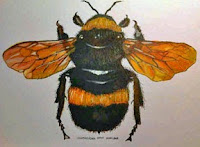Dad's favorite fishing hole could have been drawn by EH Shepard, the artist who imagined scenes, in pen, for
Wind in the Willows - and
sketched the dreams of the
Hundred Acre Woods.
His hidden place was just off a one-lane asphalt road in Indiana, past some waist-high weeds and down a rocky hill. From the top of the hill, the sound of rushing water could be heard. At the bottom, rusty corrugated pipe gushed water from the lake on the other side of the road.
He called it "the channel."

At the bottom of the hill, eddies and swirls formed as the water sluiced through the pipe - clear, cold, and a kind of slate blue. It frothed and swam around the yellow and green algae streamers that slimed the giant rocks below the pipe.
There we'd stand, on those rocks, staring down the narrow creek as it twisted into the distance. A misty spray would rise from the crashing water; with an earthy, wet smell. Waves of tall, sharp grass – and sometimes corn – could be seen on the hill atop the curving banks.
"You can catch anything here." My father would sometimes shout to be heard above the sound of the water. "This is where they caught that dogfish." Dogfish? Eyes widened, we'd stare into the waters and wonder if we had fishing line that was strong enough to land one of these mysterious monsters.
Sometimes we only had a bamboo cane pole from my grandfather's rusty Sears shed near the lake. Sometimes Zebcos. But it didn't matter. Dad was there.
In the humid cove, surrounded by weeds and willow trees, the mosquitoes were especially bad. But in his metal tackle box, my father had a brown glass bottle that he cherished as much as any lure. It sat among his purple plastic worms and cellophane packages of pre-tied hooks. I remember the label on the bottle - still partially readable.
It was from Monterey Pharmacy, and printed under its telephone number (Hilltop 5-9555) in typewriter letters, was the word "Citronella."
Oh, Citronella. Not the lightly-scented stuff found today in backyard candles. It was the real deal, 99.9% pure and probably illegal today. It smelled like something from an organic chemistry class – like lemons and herbs and rich oil. A drop of it filled the room with a smell unlike any other.
The other accoutremonts in his tackle box were often smeared with the oily insect repellant. Among them were beautifully painted lures, plastic frogs, dried meal worms, and empty packages of pipe tobacco.
In the channel, the water moved from the pipe into a small creek, passing under hanging willow branches and overgrown weeds and grasses. And of course, the biggest and most unusual fish always lurked under those branches, occasionally jumping - but rarely biting anything cast their way.
But with our Zebcos and cane poles, we tried. And, almost always (and unsurprisingly), our hooks and bobbers and Rapalas would get caught in the branches, in tangled monofilament messes. Then, my father would reel in his own rig and we’d push our poles into his hands. He’d pull and tug and twist - anything to get us free. More often than not, the line would snap.
Dad would then sit on a rock, smoking his pipe, and work to untangle what was left of our lines. Then, he’d reach into his metal green tackle box for another plastic worm or new hook, likely knowing it would never be seen again.
As we watched, the citronella rubbed into his hairy forearms smelled like a burning candle in the summer sun. Then we’d cast again - and try for the big one under those same wispy branches.
My father would eventually return to his own fishing pole and make a few short casts. Maybe one or two, before he'd hear his name called again.
Dad's secret fishing hole. Each time we went there, we believed in the mysterious possibilities of its unknown depths.
How many times would my father tie one of his most expensive lures on our line, then point across the channel, and whisper, "Did you see that? Cast over there, where that bass jumped!" We'd cast and wait for something amazing.
Every once in awhile on those summer afternoons, he'd help us catch a sunfish or a crappie. But more often than not, we'd climb back up the hill with our nightcrawlers, now wilted like losing lottery tickets.
"I think we should come back tonight right before it gets dark," he would offer, as we trudged along. "That's when the really giant catfish come out. At the bait shop, they told me they caught a fifty pound steelhead here last summer." The disappointment would melt away, and we'd plan our return that night, arguing about how we'd pull the monster out of the water when we caught him.
I think of dad every day. He taught us special things in his little fishing hole. Hope, selflessness, mystery, possibility, and determination. I'd like to believe he's still here, untangling our lines, tying on his favorite lures, and reminding us to cast where the big fish jump.
And when the mosquitos inevitably arrive, he'll reach into his tackle box and pull out his timeless bottle of Citronella, with it's wonderful, special smell.
The smell of summer. Of fishing. And of my father.
And sweet, sweet memories.
Thanks dad. We miss you.
*****












